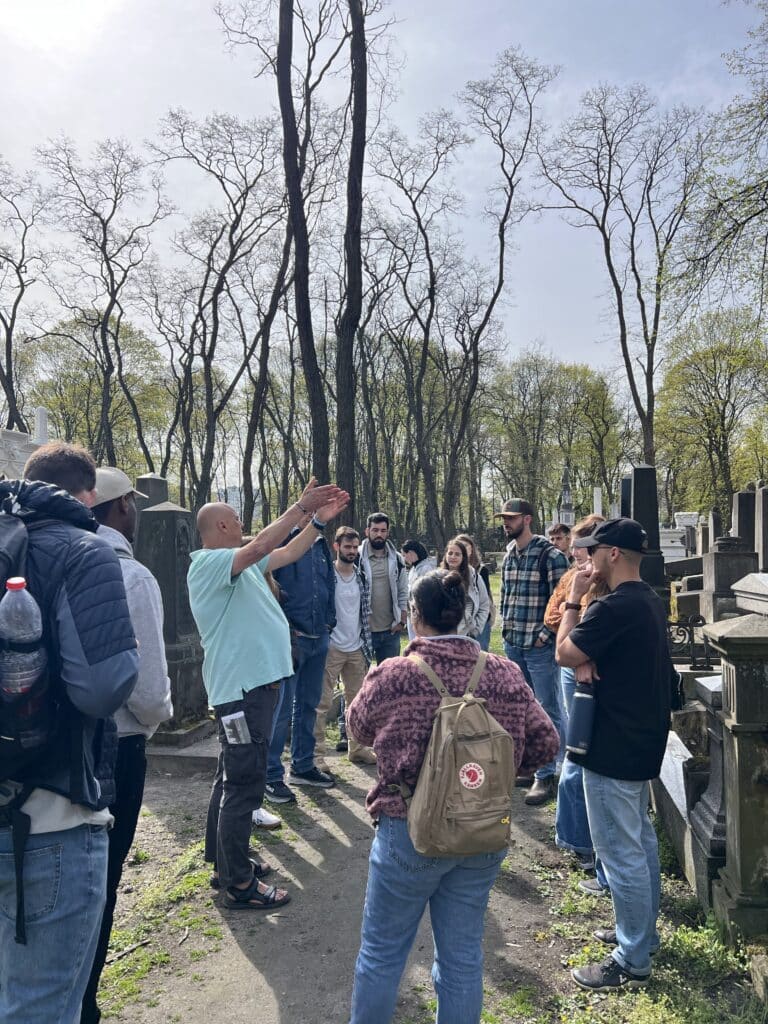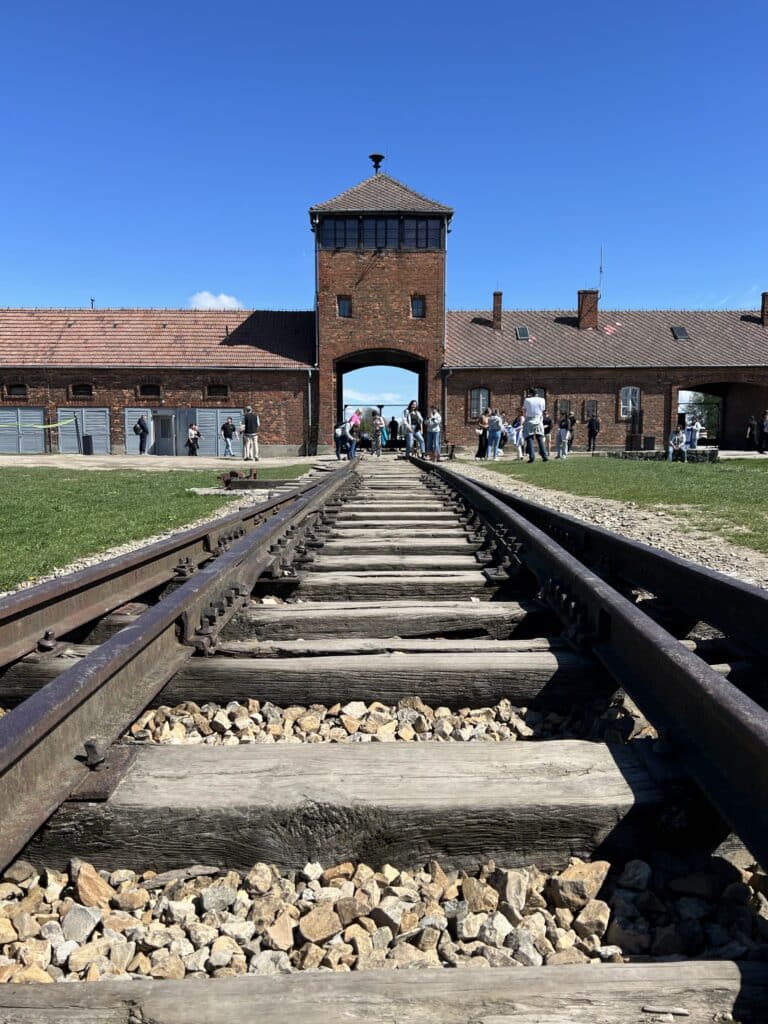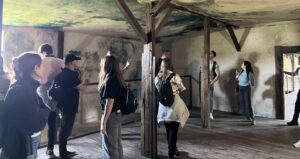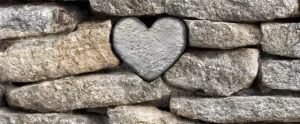ONE FOR ISRAEL invited a group of 15 young adults, mostly students, to go to Poland for a unique trip. “In Hebrew, it’s called Masa lePolin”, explained Dina Aweida, one of the team that were leading the group. “Masa” means journey, but coupled together with “Polin”, the Hebrew for Poland, every Israeli knows what it means. It’s an exploration of some of the darkest horrors of Jewish history. It’s a journey into the history of the Holocaust, up close.
Many Israelis go on a school trip to Poland as teenagers, but with this group of believers, the experience was totally different. Knowing Yeshua in those dark places changes everything. One of the participants told Dina when she went with her classmates she came back here and there was no hope. “She told me that they saw the horrors and atrocities of the Nazis, and at the end of the trip, they were left with feelings of hate, resentment and revenge. But now, she came back with some hope.” Dina agreed: “It is very difficult to see the horrors of the Holocaust, but you have a different perspective as a believer,” she said.

A Trip to Poland: An essential journey for every Israeli
As a leader, Dina was there to help the women in the group absorb what they were experiencing. She grew up next door to many Holocaust survivors— her family live right next to Beit Ebenezer, a home for elderly believers in Jesus, both Jewish and Arab.
“One of the reasons I wanted to go on this trip to Poland was that the generation that went through it is almost gone. In a few years, there will be no one left to tell the stories.” She added, “For me, as a gentile and as a citizen in this country who loves the Jewish people it was important to get to know the history on a deeper level”.
Dina reflected on their trip, saying, “You don’t really get to know the depth of evil until you see it with your own eyes. It’s important to listen to stories, read testimonies and watch movies, but seeing the actual places where it happened – the ghettos, the concentration camps, the gas chambers, the killing pits in the middle of the forest… it all brings a deeper understanding and experience of the holocaust. Our guide would incorporate many personal stories of survivors into his tour, which made history come alive,” she said.
As well as seeing key sites in Poland like Auschwitz, Treblinka, Krakow and Warsaw, the group went to a cemetery where there was a monument to Alex Dancyg, one of the hostages killed in Gaza who was born in Warsaw, linking the two events. Some of the hostages who have returned told of how Dancyg would teach them history while they were in captivity.
“After October 7th, I think we got a new perspective on what mass murder looks like. We experienced it on a much smaller scale and under different circumstances, but it made it easier to imagine what the Holocaust looked like. October 7th made the Holocaust more real.”

In some places there was nothing left but memorials, in other places it was all left as it was, to speak for itself. “Standing on the ground where they decided who will live and who will die, walking into the gas chambers and into the crematorium, standing outside the building where they performed awful experiments on human being – these are eye-opening and powerful moments” she explained.
They visited a beautiful synagogue, where the Jewish people of the town were told they were being taken to another city. “Instead, they were taken by trucks and dropped off by a forest and then led to killing pits that were prepared for them ahead of time. The nazis killed 2000 Jewish people in 2 days.” said Dina. “We went into the forest where they were murdered, and we held a memorial ceremony by the killing pits, remembering the atrocities of the Holocaust. We held the Israeli flags, and together we sang a worship song, asking God for His mercy on His people. It was hard to hold the tears back.”
The last day they were in Krakow. “We saw some of the old city and the Jewish quarter. It was a nice city, and I think that was the first time during our trip that I could see the beauty of Poland. During the first days, we drove by some beautiful scenery, but it was hard to disconnect it from the history of the land. Maybe more Jews were killed in the forest we just passed by? Maybe Jews where hiding and running for there lives behind those trees?”
Each day they visited sites and learned some of the history, and in the evenings they had thought provoking discussions on subjects like sin, forgiveness, genocide, and the value of human life.
Where was God?
Every morning they had a devotion from Yonatan Granovsky on subjects like antisemitism and its spiritual roots, how do to deal with difficult feelings as believers, and the nature of evil. It’s natural to ask questions like, how did this happen? Where was God? How did he allow this? But how do we lament to God about what happened? Their time in Poland was an opportunity to wrestle with some of these difficult concepts.
Dina gave a phrase that works better in Hebrew than it does in English, but you’ll get the point: “We’re not angry at God, but we’re angry to God.”
“When you face evil and difficulties it is okay and even necessary to bring our feelings to God, He can handle our difficult questions. It doesn’t mean we will always get all the answers, but trusting His goodness and sovereignty we can always come to Him,” she said.
Dina shared how the question of where God was in the Holocaust has even helped lead people to faith. An Arab Christian from her congregation recently gave his testimony about how interacting with Holocaust survivors contributed to his decision to follow Yeshua.
“Our congregation started with a handful of Holocaust survivors. As a young Arab, he came to a congregation where there were mostly old people speaking Romanian and Yiddish and it was hard to see how he would fit in. But he used to help driving them to the congregation and home on Shabbat, and he would hear their stories. And through their stories he realized a powerful truth – he saw that God was with them in the Holocaust. Then he he knew that if God was with them, He’s was going to be with him also.”
God allowed that to happen, and yet He has never abandoned His people. “We don’t understand why it happened this way, why it had to be so horrific, but we do know that the Nazis were not able to eliminate the Jewish people, just like no one was able to do it before them, and no one will do so in the future. There is hope in trusting God’s promises over His people,” Dina explained.
Thus says the Lord,
Who gives the sun for a light by day,
The ordinances of the moon and the stars for a light by night,
Who disturbs the sea,
And its waves roar
(The Lord of hosts is His name):
“If those ordinances depart
From before Me, says the Lord,
Then the seed of Israel shall also cease
From being a nation before Me forever.”
(Jeremiah 31:35-36)
Evil, sin, and forgiveness
“The Nazis were sinful people and so are we,” said Dina. “Sometimes we see the Nazis as a group of evil psychopaths, but with right agenda and education, the truth is that it is not hard to make people this evil… We somewhat lived through that reality on October 7. We don’t want to think that we would be able to do anything like that, but I think we all have the potential to do evil. It taught me a lot about how I see myself and how much grace God has towards me,” she added.
“We were called enemies of God – something I have heard and known all my life. But facing the events of October 7th and now the horrors of the Holocaust so closely helped me realize the depth of the word “enemy”, the deep separation from God, and therefore the great amount of grace I had to receive to be a reconciled with Him. That realization is life-changing. I thought that this would be a Holocaust tour with a spiritual aspect, but for me it was a spiritual journey.”
On the first night of the trip they talked about the value of each person made in the image of God, contrasting with Nazi ideology that gave some worth more than others: Jews, gypsies, Germans with disabilities, homosexuals, and addicts were all deemed unworthy to live.
“Clearly, everyone would agree that it’s a horrific, dehumanzing ideology, but let’s examine ourselves today. For example, don’t we say that a baby with a disability shouldn’t be born? That a baby shouldn’t be born to a poor family? That unplanned babies are a burden on our families and society?” said Dina, referring to the millions of lives lost through abortion. “We devalue people all the time (babies, old people, people with disabilities). We value each other by their contribution to our lives and to society, and not by their innate worth as human beings created in the image of God. With the right terminology, sugarcoating it with different humanistic labels, we have made it acceptable. I think part of our journey was to look at the history, but also trying to bring what we learned into our times. What can we learn from what happened? How have things changed? Have they changed? We still need grace today.”
The group also discussed the whole idea of genocide. God told the people of Israel to wipe other people out. Is that the same as what the Nazis did? How is it different? They discussed forgiveness, the basis of our hope for eternal life, and whether repentance is a requirement or not here on earth with others, as it is required by God.
“You gain a deeper understanding of what sin and evil are. And if you self-examine yourself, you have to ask some difficult questions: Could this have been me? Could I have been on the wrong side of history? It’s quite possible we all could have been, isn’t it? Very few people stood up.”
Would you hide me?
The group visited a town in Poland where some 130 families were hiding Jews. “There’s a museum in memory pf all the Polish people who helped Jews in the war. We heard many stories and it was amazing. In the museum there was a room dedicated to a family from that town who were hiding several Jews until someone discovered it and told the Nazis. The Nazis came and shot the whole family – not just the parents, who decided to hide them, but also all of their six very young children. This put in perspective the bravery of those who chose to help the Jews and resist the evil of the Nazis.”
It’s one thing to give your own life to save others, but to put your own children at risk is something else entirely. “It was very costly,” Dina emphasized. “Amazingly, none of the other families were discovered by the Nazis, but it makes you think of whether you would have been willing to risk your and your family’s life as they did.”
Many people have tried to extinguish the Jewish people but God has kept us. “Seeing the evil that occurred back then, and is still very real today, we have to choose to hold on to the truth that God hears his people, sees his people, and will not forsake his people,” said Dina.
“This trip was very significant for me. Besides learning about the historical events and seeing and experiencing the horrors of the Holocaust so closely, with the spiritual perspective given through our morning devotions, discussions and community of believers, it turned this trip into a spiritual journey, forcing me to face fundamental issues of the faith, such as evil, sin and the grace and faithfulness of God.”
















